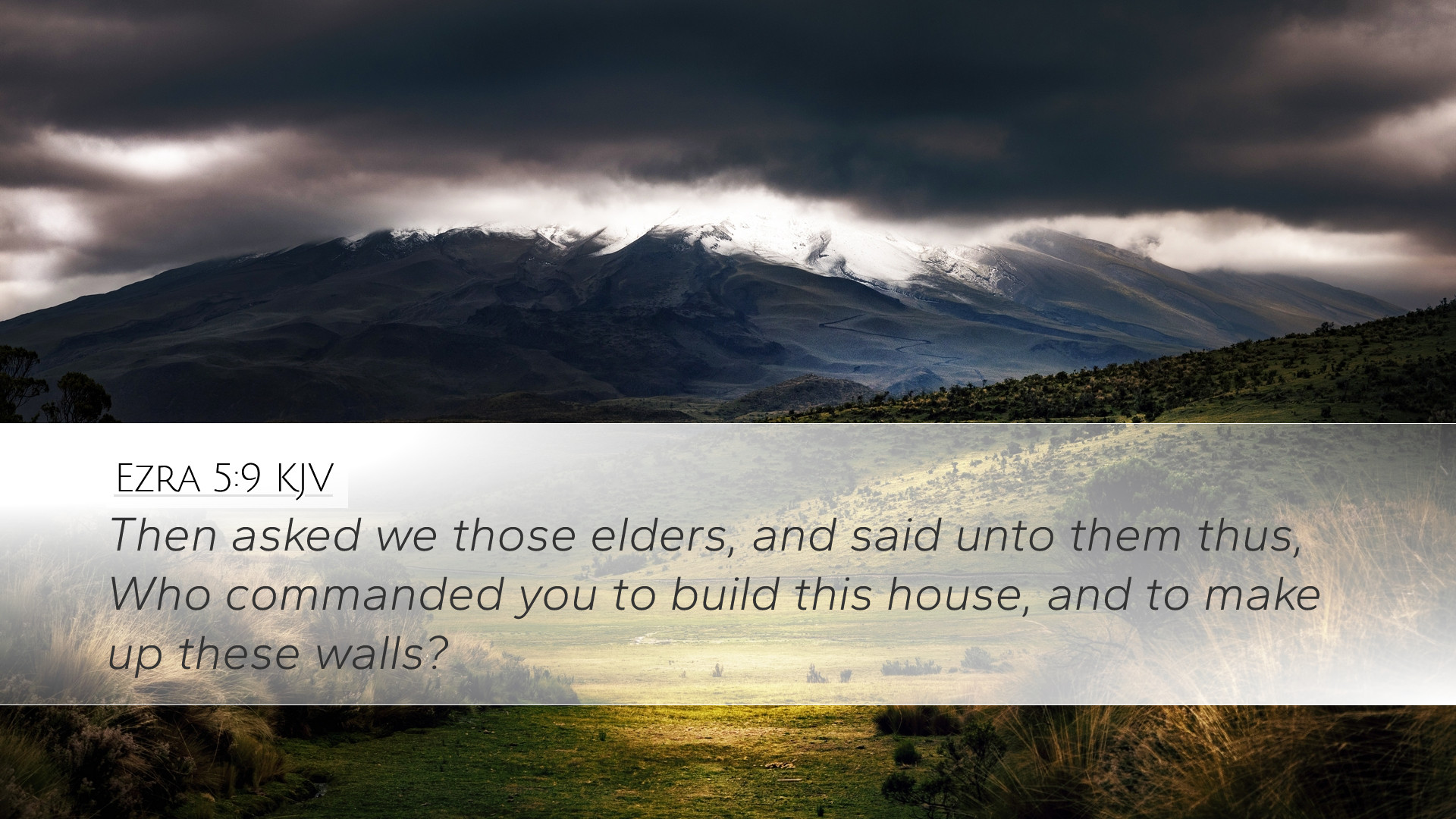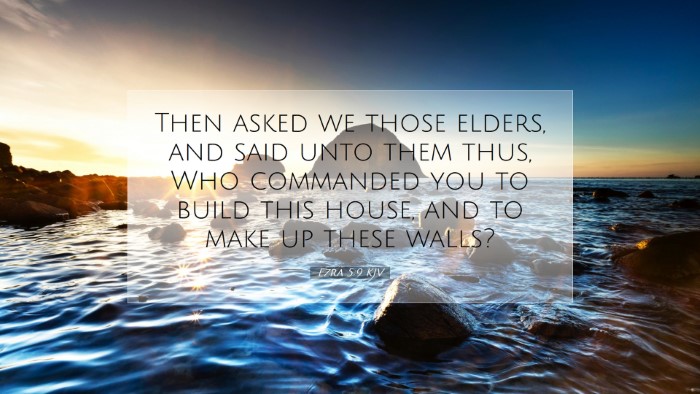Old Testament
Genesis Exodus Leviticus Numbers Deuteronomy Joshua Judges Ruth 1 Samuel 2 Samuel 1 Kings 2 Kings 1 Chronicles 2 Chronicles Ezra Nehemiah Esther Job Psalms Proverbs Ecclesiastes Song of Solomon Isaiah Jeremiah Lamentations Ezekiel Daniel Hosea Joel Amos Obadiah Jonah Micah Nahum Habakkuk Zephaniah Haggai Zechariah MalachiEzra 5:9
Ezra 5:9 KJV
Then asked we those elders, and said unto them thus, Who commanded you to build this house, and to make up these walls?
Ezra 5:9 Bible Commentary
Commentary on Ezra 5:9
Ezra 5:9 states: "Then asked we these elders, and said unto them thus, Who commanded you to build this house, and to make up these walls?" This verse captures a critical moment in the history of the Jewish people as they sought to re-establish their identity and worship in Jerusalem after the Babylonian exile. The inquiries made by these elders reveal a significant dynamic between authority and community voluntary service in the reconstruction of the temple.
Contextual Background
The book of Ezra documents the return of the Jewish exiles from Babylon and their attempts to rebuild the temple in Jerusalem. After a period of initial success, hostility from surrounding nations forced the work to halt, leading to a complex interplay shown in Ezra 5:9, where question and authority are paramount.
Insights from Commentators
Matthew Henry's Commentary
Matthew Henry emphasizes the importance of this inquiry as an expression of the religious leaders' duty to ensure that those involved in the sacred work possess proper authority. He suggests that probing questions are critical for maintaining the integrity of the rebuilding efforts. This perspective is essential for understanding the accountability that leaders in ministry should have towards their congregations during religious undertakings.
Albert Barnes' Notes on the Bible
Albert Barnes highlights that the question posed to the elders indicates a more extensive concern regarding the legitimacy of the rebuilding efforts. Barnes points out that the elders were inquisitive, wanting to ascertain whether divine sanction or governmental endorsement underpinned the rebuilding. This aspect is vital for scholars and theologians considering the balance between divine calling versus social governance regarding church functions.
Adam Clarke's Commentary
Adam Clarke observes the significance of the elders asking about who authorized the construction. According to Clarke, this reflects a hierarchical structure in ancient Israelite society where clear lines of authority were deemed crucial for communal actions, especially sacred tasks like building a temple. He further asserts the need for confirmation of divine will to instigate spiritual responsibilities, which adds theological depth in understanding roles within religious communities.
Thematic Reflections
- The Authority of Leadership: The elders' inquiries in Ezra 5:9 highlight the necessity of legitimate authority when performing community and spiritual duties. Leaders must seek to have both divine and communal approval when leading others in sacred tasks.
- Divine Mandate vs. Human Authority: The relationship between divine call and institutional acknowledgment is a recurring theme in theological discussions, particularly within the context of church governance.
- Challenges of Rebuilding: The rebuilding efforts faced skepticism and resistance, which finds parallels in various modern-day church revitalization efforts. Understanding authority and clarity can aid contemporary ministers in similar undertakings.
Application for Modern Readers
For pastors and church leaders today, the essence of Ezra 5:9 begs a careful evaluation of their actions and directives. Just as the elders sought to clarify who commanded the building, church leaders must grapple with their motivations for initiatives. Is it truly a calling from God, or is it a response to societal pressures?
The individualistic approach to spirituality often overshadows the communal aspect observed in Ezra's narrative. Therefore, contemporary Christians must recommit to a community-focused faith that honors collective decision-making and accountability in both worship and activities.
Conclusion
In summary, Ezra 5:9 encapsulates a profound lesson in authority, community, and divine mandate. The inquiries of the elders assist in revealing multiple facets of leadership and the significance of transparency in service to God. By drawing insights from the comprehensive commentaries available from scholars like Henry, Barnes, and Clarke, modern readers, including pastors, students, and theologians, can delve deeply into the implications of this scripture for their experiences today.


